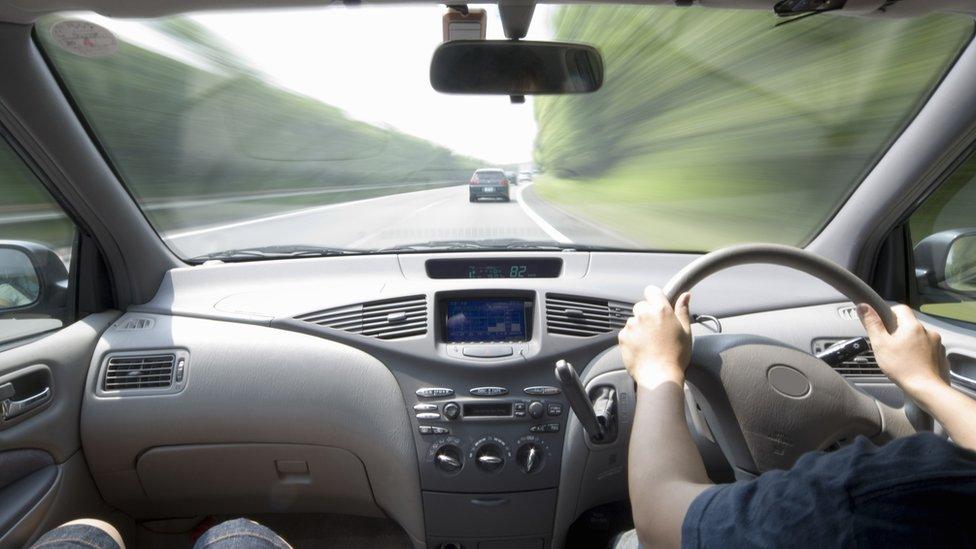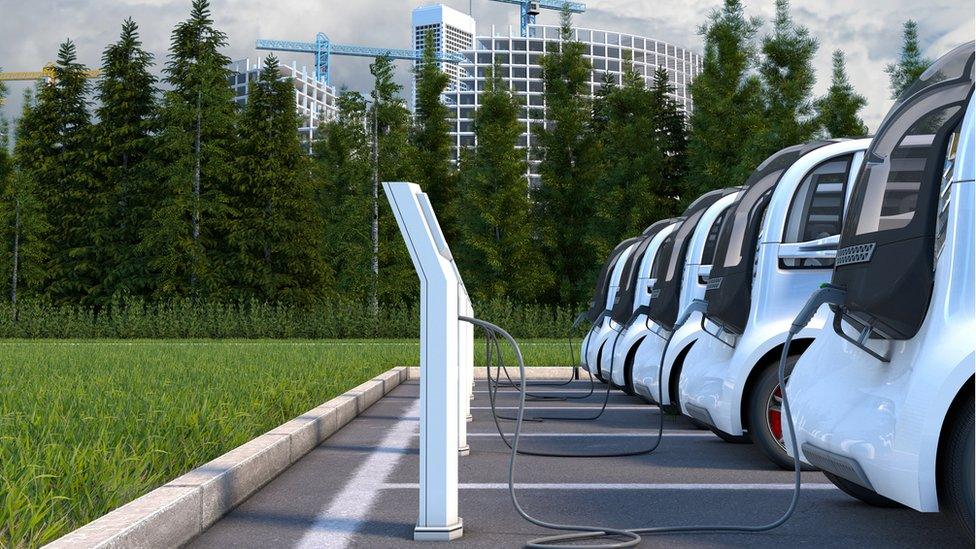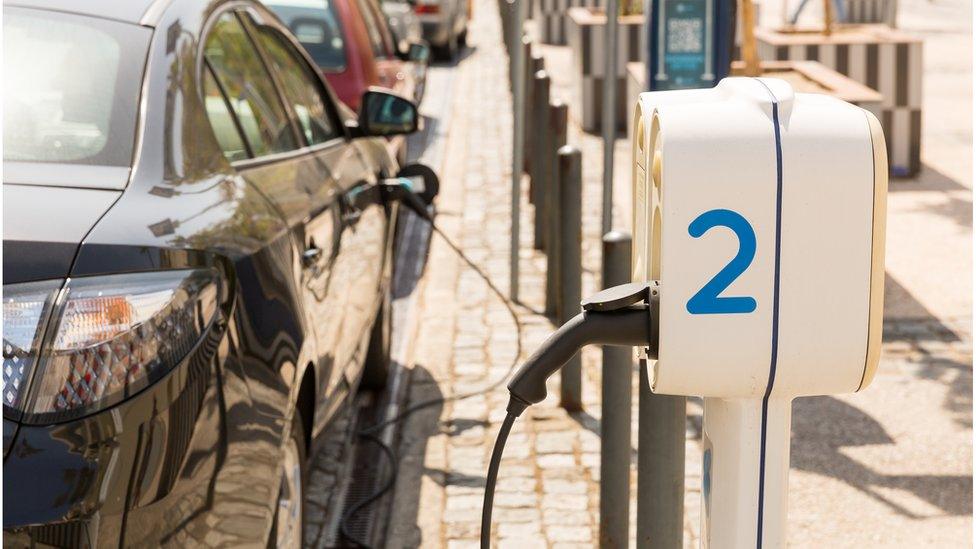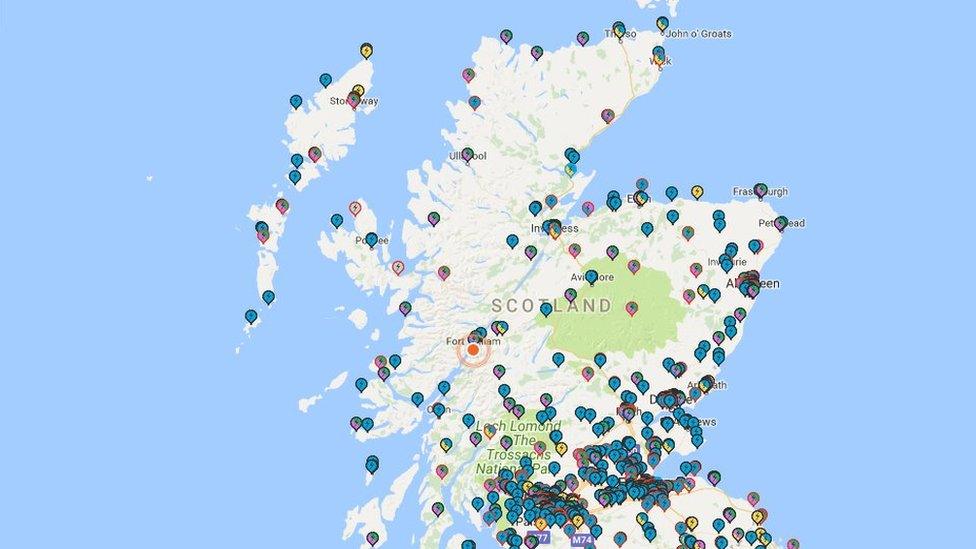Electric vehicles: Getting over the 'range anxiety'
- Published
- comments

Exhaust fumes will be a rarer sight in 15 years time, the Scottish government hopes
The first minister has set a target for new petrol and diesel vehicles to be phased out in Scotland by 2032. Nicola Sturgeon made the announcement as part of her programme for government for 2017-18. More people are buying electric vehicles, but there are significant challenges ahead if we're to be weaned off the combustion engine completely.

Four years ago, there were just 3,500 electric vehicles in the UK. As of August 2017, there are almost 113,000, external.
But many in the industry believe the market will soon see even bigger growth. It's not just Scotland - most European countries have targets for phasing out combustion engine vehicles.
"It's expected that the big rush to buy electric vehicles (EV) will be this year or next year," says Paul Minto.
He's a partner in the energy and utilities team for global law firm Addleshaw Goddard, and an industry expert.
"Motor Trade Association figures show sales are now booming. They're on the upward curve."
It doesn't seem that long ago that electric vehicles were mainly for a select band of car buyers who were either very wealthy or who only made very short journeys.
The advance of technology - in particular battery technology - is changing this rapidly. As the prices comes down and range goes up more people are buying EVs.
But Mr Minto says that there needs to be a corresponding focus on the infrastructure needed to keep all these batteries topped up, to keep EV owners from suffering the dreaded "range anxiety" - the fear your car will slow to a peaceful stop before it reaches its destination.
The starting point is to install trickle charging points in people's homes.

Driving an electric car long distances means careful planning to recharge along the way
This is easy if you have your own drive, but - as Ms Sturgeon has acknowledged - many people in Scotland live in tenements.
So how do you ensure that several hundred people living in a block of flats can all charge their cars up overnight?
And how does the National Grid cope with the inevitable strain as everyone plugs their car in every evening?
These two problems are the "missing pieces in the jigsaw", according to Mr Minto. They're also where the big "commercial opportunity" is. There's lots of money to be made for those who can find the answers.
One of the ways mass-charging points can be created in densely-populated urban areas is with massive batteries kept in shipping container-style boxes.
"You can locate big batteries anywhere you want and attach EV charging points to those," says Mr Minto.
"Those batteries can be charged at any time of day or night so you do it when it's cheapest. Or you can use a renewable energy source like wind or hydropower to charge them."
These big batteries have two advantages - they're an efficient way of providing a lot of charging points in a small area and they "smooth out" the demand for electricity at certain times.

Employers could provide charging points in the office car park to help spread the charging load
Mr Minto says these big batteries could easily be installed in the corner of an office car park and could have 50 charging points attached.
The batteries already exist, but there's a "vast" technology race under way to make them cheaper, smaller and faster-charging, he says.
And in urban areas we should be prepared to see parking meter-style charge points popping up on many roads - potentially providing a plug-in facility for every parking space on a busy street.
Other possibilities for charging lots of cars in a small space include more futuristic designs - like towers which stack cars up, external while charging them.
It's this type of solution that the Scottish government needs to embrace if mass electric car ownership is to become a reality. It's also one of the reasons Ms Sturgeon announced a £60m innovation fund alongside the 2032 target.
But Scotland has another big challenge to overcome with electric cars.

Parking meter-style charging points could be installed on city roads
Although there are densely-populated cities, the vast majority of the country is rural, with big distances between villages or small towns.
It's enough to make a range-anxious electric car owner go weak at the knees. Or is it?
Es Tresidder lives just outside Fort William, where he runs his own business designing low-energy buildings.
Until last year, he was living in Brussels where he and his family didn't need a car to get around - but he realised that would change once he moved to Scotland.
Being immersed in the green economy and low-energy design, he was keen to try an electric car, but wasn't sure if it was the best option in a rural area.
"I initially thought there was no way it would work. Looking at web forums for electric car owners, I was told by many people it wouldn't work as my only vehicle in somewhere like the Highlands.
"But then I looked into it a bit more and decided it was worth a gamble."
'More convenient'
He bought a second generation Nissan Leaf, one of the most popular models of electric car in the UK.
Mr Tresidder acknowledges there's a perception EVs are only good for small journeys in big cities - but says his experience has been "surprisingly good" so far.
"For most of my usage I won't use the public chargers at all - I just use the one at our house.
"If you've got somewhere to charge at home or work, that's all you will need for most of your charging," he says.
Home chargers like Mr Tresidder's are generally slower, but are fine for overnight charging.
"It's actually more convenient than a petrol or diesel car because I never have to go to a petrol station.
"There's also very low maintenance. All I've done on my car in the last 12 months is topped up the windscreen fluid and put some winter tyres on."
Broken charger
The range on Mr Tresidder's Nissan is about 120 miles (193km) - though it varies with the temperature and the speed he drives - which is more than enough for everyday use, he says.
"When I do go on longer journeys, the average speed in the Highlands means I'm driving long enough that I'm ready for a half-hour break - especially with three children."
The rapid charging technology found at most public charge points will bring the Leaf's batteries up to 80% in about 30 minutes.
Mr Tresidder says he's not yet needed to queue to plug his car in and has only found one charger that didn't work.
That was in Mallaig, where someone let him plug in to their wall socket with a standard three-pin extension lead for a couple of hours, which gave him enough charge to get home.
But he admits there are occasions when owning an electric car feels a lot more inconvenient than driving a petrol or diesel model.
"My parents live in Derbyshire and to go to see them I think I have to stop five times [to charge] - that's considerably less convenient.
"But then I only do that journey a couple of times a year and it's cost me £10 rather than £60 or £70."
There are also apps and websites, external to show the location of EV charging points - and sometimes even if they're occupied or not - which helps to keep the range anxiety at bay.

Websites and apps like this one from Zap Map help electric car owners find EV charging points
There will clearly need to be a lot more charging points installed around Scotland to keep up with the rise in EV ownership.
Or could part of the change over the next 15 years be a move away from traditional car ownership altogether?
If fewer people own cars and instead share them, or use public transport, then the pressure on the charging infrastructure is reduced.
Mr Minto believes there's likely to be a cultural shift soon.
"Over the passage of time, the ownership model of cars will become less important. We are may be the last generation to want that," he says.
"Already on the west coast of the USA you see driverless, autonomous vehicles.
"They're just driverless pods - in effect you're no longer owning a car, you're just sharing time in one."
This might seem impossibly far into the future.
'No sacrifice'
But Mr Tresidder says he has no doubt that electric vehicles of some kind are in his future. He says he'll never buy another petrol or diesel car again.
"Driving a petrol or diesel would feel like a step backwards in terms of how nice it is," he says.
"This summer we did a house swap for our holiday which included a car swap.
"The petrol car we got was noisy and smelly. You had hill starts and the business of balancing the clutch.
"We stalled it constantly. We spent lots of money at petrol stations. It wasn't that nice at all.
"People often think of climate change mitigation in terms of sacrifices, but electric cars aren't a sacrifice at all - they're an improvement over what we're used to."